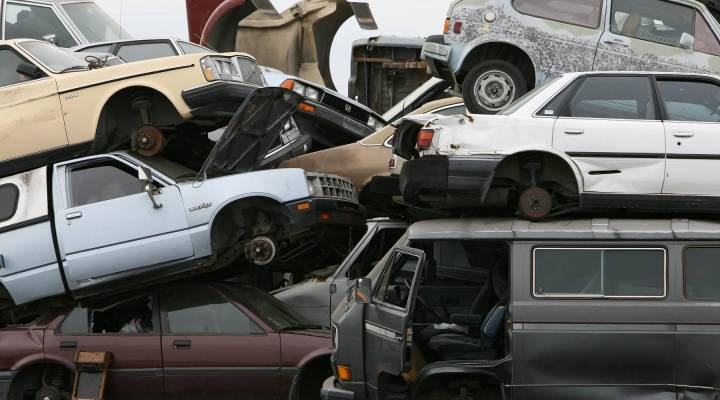
How junk bonds are like junk yards

Steve Chiotakis: The people who put their money in riskier bonds are hoping 2012 is a better year for their returns. Bank of America Merrill Lynch says it’s the first time in three years lower grade bonds didn’t do as well as safer investments. Bonds, of course, take many forms. Countries sell them to pay their debts, if they can — See: Greece. Companies offer them up too.
And Marketplace Whiteboard chief Paddy Hirsch takes us on a little field trip to explain how different bonds — with different ratings — work.
Paddy Hirsch: This is a used auto parts center.
Chiotakis: Used parts? No Paddy. This is a junk yard.
Hirsch: Oh really?
Chiotakis: Yeah. See that rusted old jalopy over there? That is junk.
Hirsch: It’s all in the eye of the beholder, Steve. You see junk, I see a valuable store of parts for my 2001 Saturn LS1.
Chiotakis: Really? You’d take parts from some wreck that’s been towed here and put those parts in your car? Don’t you think that’s a bit risky?
Hirsch: Well, I’d be getting them at a discount to what I’d pay on Ebay, and they’d be way cheaper than if I got them from a GM dealer, that is for sure.
Chiotakis: OK, fair enough, it’s your funeral. But what has this got to do with bonds?
Hirsch: Bonds are just like car parts.
Chiotakis: They are?
Hirsch: Well, sure. If you buy parts that are brand spanking new from the manufacturer, still all greased up and ready to go, they’re pretty low risk, right?
Chiotakis: Right.
Hirsch: You’d be happy to put them in your car?
Chiotakis: Sure.
Hirsch: Bonds are the same. Some bonds are super safe. They’re sold by companies that are profitable, that look very likely to make their interest payments and pay their lenders their money back.
Chiotakis: I’d be happy to put those bonds in my portfolio.
Hirsch: Right. But some bonds are not so safe. They’re sold by riskier companies — like companies that might have borrowed a lot of money, or maybe operate in uncertain industries. Companies like these may not be able to make their debt payments; they may not even be able to pay you back. Those bonds are like the car parts you buy from a place like this.
Chiotakis: A lot riskier.
Hirsch: Sure, but potentially a lot more profitable in the long-run. See those low risk bonds that you like so much, they also come with a low reward. Ratings agencies call them investment grade bonds, and the interest rates they pay are pretty small.
Chiotakis: All right. Low risk, low reward. That makes sense.
Hirsch: But these high-risk bonds, they come with much bigger interest rates to compensate for the danger. Ratings agencies call them non-investment grade, or high-yield bonds.
Chiotakis: And some people call them junk bonds.
Hirsch: Yes, some people call them junk bonds. Because, I guess, like a second hand part in a car, they can turn out to be junk, and you can end up wasting your money. But if the bond turns out to be a good investment, then because of that high-yield you can make a ton of money. In the same way, if I can find a working transmission for my Saturn for twenty bucks here, as opposed to paying $700 for a new tranny at the GM dealership, then I make out like a bandit.
Chiotakis: So junk bonds — sorry, “high-yield bonds — are riskier. They can turn out to be trash, right?
Hirsch: Right, but they’re called high-yield for a reason — because they can turn out to be treasure. One man’s junkyard is another man’s jewelbox, Steve!
Chiotakis: Yeah, thanks for that, Paddy. Marketplace Senior Producer Paddy Hirsch’s personal finance Whiteboard explainers
are online here.
There’s a lot happening in the world. Through it all, Marketplace is here for you.
You rely on Marketplace to break down the world’s events and tell you how it affects you in a fact-based, approachable way. We rely on your financial support to keep making that possible.
Your donation today powers the independent journalism that you rely on. For just $5/month, you can help sustain Marketplace so we can keep reporting on the things that matter to you.


















